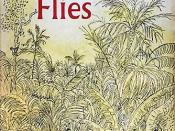The Lord of the Flies, while containing some sources of pleasure, is a very disquieting book; the setting, the antagonist, the epiphany, and many of the story's events all contribute to the disturbance of the reader.
The story takes place on an uninhabited island in the middle of the Pacific Ocean; it is miles and miles from any known civilization. The characters are first met after stepping out of a scar in the dense forest covering the island, caused by the plane crash, and gathering together on a rocky platform. This platform overlooks a quiet little lagoon, formed by a coral reef, and a pleasant stretch of beach. The platform becomes a meeting place for the boys where they attempt to construct a semi-civilized society. As we move down the beach we see a mountain in the middle of the forest, and at the far end of the island there is a rocky outcrop, dubbed castle rock by the boys.
The boys left the area surrounding castle rock unexplored until they had to explore it; when they did, they were deathly afraid of what they might find. The forest, dense and dark, housing who-knows-what kinds of evil, is also a source of fear for the boys. The island is too new and untouched, too free, leaving something wanted: the guiding hand of authority.
The boys recognize the lack of authority on the island; they elect a leader to try and correct this lack. However, the antagonist of the story, Jack, tries to usurp the elected leader, Ralph, from the beginning. "I ought to be chief," says Jack (pg 21). And when he was not elected "the freckles on (his) face disappeared under a blush of mortification" (pg 21). It is under Jack's orders that the signal fire,


